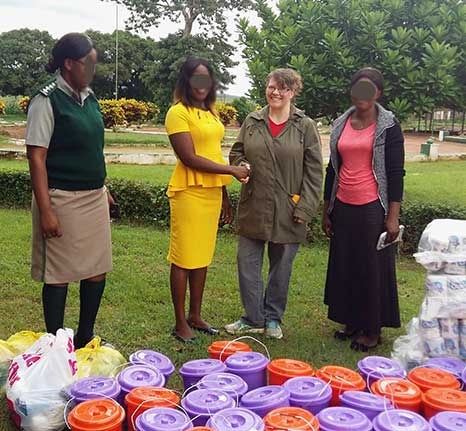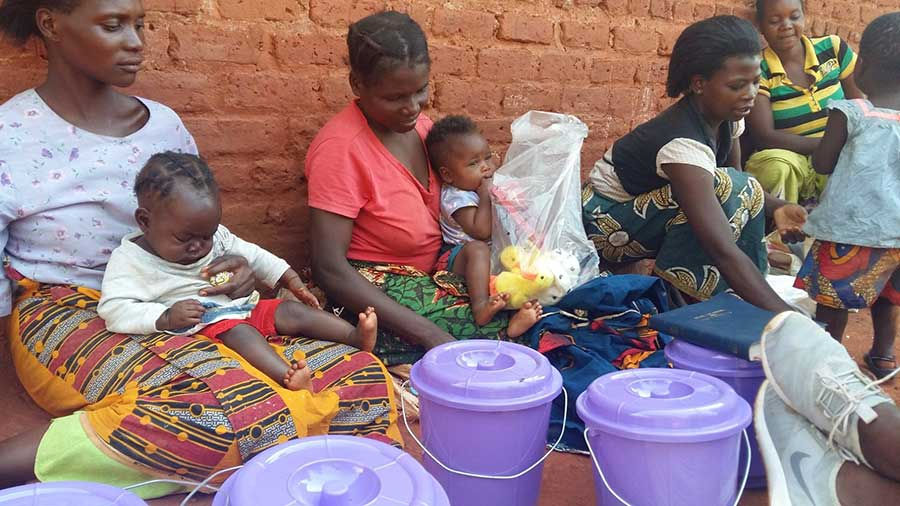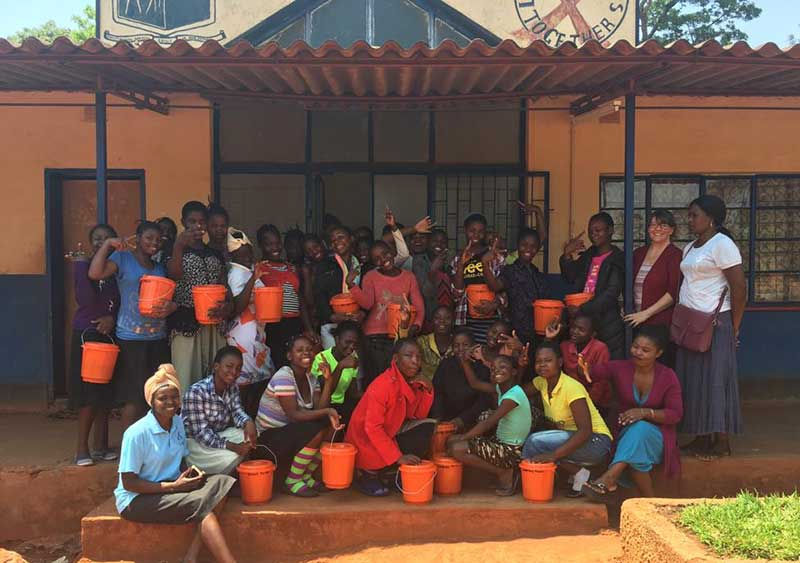Tackling Zambian taboos in prisons & schools

The topic of menstruation is a taboo subject where I live. For the past seven years, my family has been living as Baptist missionaries in Zambia, Africa. While we mainly focus on the Deaf community, recently I have felt a tug toward the women in our local prisons. This past January I was approved to physically be on site in the prison grounds, and one of the first things I did was address their needs for menstrual supplies.
(My visit to the prison Christmas Eve morning Dec. 2018. The buckets are the menstrual kits. Faces of prison staff blurred for safety)
You see, Zambian prisons vastly differ from first-world prisons. There are basic things that are not provided unless you have family members nearby who can help you. Items like toilet paper and menstrual supplies fall into the category of things the prison does not provide. When I interviewed the Officer in Charge of the prison I currently work in, she shook her head sadly and said she had no idea what the women used in the toilet, or what they used when on their periods. She had compassion for the women, but was helpless to supply their needs as funding is so short. She mentioned them using newspaper or any other kind of paper they could find. We have since given them a supply of toilet paper and menstrual kits for every woman, but the toilet paper is used up so quickly. This opens the women up for infections, the spread of disease, and issues with the plumbing in the toilets. The water in the prison is shut off at night, since they are currently without a pump to fill the water tank (a project I am working to rectify), so as of right now there is no access to clean water once they are in their cells for the evening. Although each cell has its own toilet, they cannot be flushed until the morning time when the water is turned back on from the town supply.
There are a lot of urban legends, if you will, surrounding periods here in Zambia. When I interviewed some of the Deaf women we work with to ask what they thought about periods, here is what they said:
You cannot eat or drink anything red during your period.
If you leave your menstrual cloths outside and someone steals them, you will never get your period back.
If a male member of your family sees your period blood, they will go blind.
If a witch doctor gets ahold of your period blood they can use it in rituals against you.
If anyone sees your underwear on the line during your period, you will be barren.
Your period makes you dirty, so do not greet people.

(meeting with my neighbors, talking menstruation - purple buckets are the menstruation kits)
Menstruation is not something that mothers teach daughters. Usually an aunt or grandmother, or even a respected local woman in the village will teach girls about their periods. And they will be sure to tell them all the local superstition regarding their periods. In many cases, this is to make sure they take care of their homemade supplies well so they aren’t stolen or ruined. Depending on the area, the women either burn or bury their supplies after use, so the superstition fits their tradition.
I have had the opportunity to go into the local school for the Deaf and debunk these myths. It was amazing to see the eyes of the girls light up as I went through them one by one and explained how they could not be true. It is empowering to these girls to receive kits with menstrual supplies that they can re-use and stay in school. So many of them were missing class during their periods because the lacked supplies. Now they can go in confidence that they are protected during their periods. In the next week I will also be going to the Blind School and the hearing village school.

(My visit to the Deaf school. The girls were thrilled with their kits! )
We started with our local Deaf community who are marginalized first of all because of their deafness, and secondly because of the poverty so many of them find themselves in once they leave home. Then we branched our to our neighbors. It was disheartening to me to see women struggling for ways to provide themselves with menstrual supplies. There are a lot of women who participate in ‘transactional sex’ or sexual favors in order to get the money they need to afford supplies, or to have someone buy them supplies. This is dangerous as HIV/AIDS is an enormous issue here in Zambia. By supplying these kits to local women, it removes the burden of them having to sort out how they will afford supplies. It has been such a blessing to be able to be a small part of helping women and girls understand how their bodies work, to let them know that their periods aren’t shameful, but a gift from God, and to literally hand them hope in a small bucket.
.png)


































